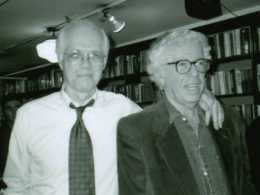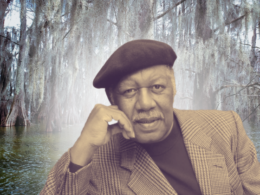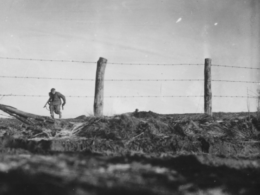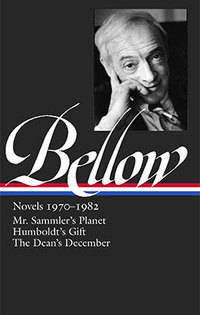
In connection with the publication in October 2010 of Saul Bellow: Novels 1970-1982, edited by James Wood, Rich Kelley conducted this exclusive interview with Wood for The Library of America.
LOA: Toward the end of his 1976 Nobel lecture Saul Bellow strikes an almost mystical note: “The essence of our real condition, the complexity, the confusion, the pain of it, is shown to us in glimpses, in what Proust and Tolstoy thought of as ‘true impressions.’ This essence reveals and then conceals itself.” And he goes on to say that “The value of our literature lies in these intermittent ‘true impressions.’” Are there specific scenes or passages in Bellow’s work that correspond to what he meant by “true impressions”?
Wood: These “true impressions” were intensely meaningful to Bellow, and constituted a kind of mystical religious belief for him. Proust offers one example—the power of involuntary memory to offer revelation and new connections; Tolstoy offers another example—one thinks of those moments when Levin or Pierre or Ivan Ilyich suddenly grasp an answer to the question: “how should I live, and why?” The last thirty pages of Humboldt’s Gift and The Dean’s December offer visions of these true impressions—one thinks particularly of the astronomy observatory in the latter book. Other moments in his work would be the revelations of universal brotherhood experienced by Tommy Wilhelm in Seize the Day and by Woody in the story “A Silver Dish.”
But there is another way of thinking about these “true impressions.” Bellow’s characters are always thinking, and often remembering, and thus it is fair to say that many of the scenes that we think of as “Bellovian”—the Russian baths in Humboldt’s Gift, Mr. Sammler remembering the Second World War, Albert Corde describing the Chicago housing projects in The Dean’s December, Max Zetland in the train from Chicago to New York in “Zetland: By a Character Witness”—these are all introduced to us as the property of someone’s remembering mind; reality is almost always an impression of reality in Bellow, because it is reality as passed through a mind, reality once consciousness has got to work on it. This is one curious way in which his work is full of reality while also evading the norms of realism. Thus much of what we encounter in Bellow is already a “true impression”—a vivid partiality, a remembered vitality.
LOA: Saul Bellow: Novels 1970–1982 collects the three novels Bellow wrote as he moved from his mid-fifties into his late sixties: Mr. Sammler’s Planet, Humboldt’s Gift, and The Dean’s December—the seventh, eighth, and ninth of his fourteen novels. Many critics sensed a change in Bellow’s tone: darker, angrier. Do you see a connection among these three novels? How would you characterize their place in the progression of Bellow’s work?
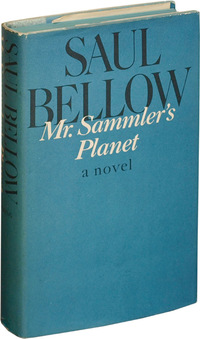
Wood: It would certainly be right to see Mr. Sammler’s Planet as the book that marks the onset of Bellow’s late conservatism—the politics that famously allied Bellow with Allan Bloom’s The Closing of the American Mind. There is a kind of despair in these books that is the basso continuo to the lighter, airier strings of Bellow’s joyous comedy: a despair, as Bellow saw it, about a new American nihilism and amnesia, especially in the post-Woodstock generation; about an urban poverty and recklessness that was blighting areas of the major cities; and about the bitter racial politics that followed the successes of the civil rights struggle.
Bellow was right to identify these as important currents of American life during the 1970s and 80s. My own opinion is that the racial tilt of his conservatism spoils Mr. Sammler’s Planet, and that Bellow had no need to lend Allan Bloom the imprimatur of his reputation. Bellow’s conservatism, in the end, is not Bloom’s reductive and close-minded kind, and indeed is not formally political (I am pretty sure that he voted Democrat for most of his life). It is, instead, moral, and in this sense one can trace a connection between, say, the moral complaint in Seize the Day (1956), Herzog (1964), and The Dean’s December (1982). All three books continue a comic but anguished analysis of certain excesses and dangers in American spiritual life. Seen in this light, the three novels written between 1970 and 1982 don’t constitute quite the break that certain readers (James Atlas, for one) imagine. It is Sammler that stands out, in its anger.
LOA: Bellow once said of Mr. Sammler’s Planet: “It isn’t even a novel. It’s a dramatic essay of some sort, wrung from me by the crazy Sixties.” Is that a fair assessment? Winner of the National Book Award, this novel addresses the impact of the Holocaust more directly than any of his other works and includes many memorable scenes: from the black pickpocket exposing himself to Sammler to Sammler’s recollection of killing a German soldier. Can we trust what he says about his own work?
Wood: Bellow was always rueful about Mr. Sammler’s Planet, and indeed, as I suggested before, it is this novel, not Humboldt’s Gift or The Dean’s December, that stands out strangely from the rest of his work. I remember him saying, once, that the critic John Bayley was perhaps “right to have called Sammler a shallow novel.” I guess we can trust Bellow’s self-assessment as well as we can trust any author’s. That said, all of his novels after The Adventures of Augie March (1953), not just Sammler, are dramatic essays of a kind; it is perhaps what certain readers don’t like about his work.
Curiously, this is exactly what I do like about his writing: I enjoy the capaciousness of the forms, the sense that fiction can take a lot of essayism and not buckle, the way that these books are full of life but not traditionally realistic. It is very hard to find any sentence in these books along the lines of “He finished his drink, and left the room”—the kind of standard sentence of domestic realism you might encounter in Richard Yates, or even Norman Mailer, or in scores of less talented novelists. Instead, Bellow’s work represents an amazing evasion of this kind of grammar of realism; and this evasion renovates and renews American realism at the very moment that postmodernism was happily dismantling it.
I love the way that in Bellow characters are poured from scene to scene; that people do not enter rooms and cross streets in quite the way they do in the work of other writers; that there is always an authorial voice strongly heard on the page. I even love the way that Bellow’s formal storytelling—again, in a normative, realist sense—is rather poor, and the way in which his plots always seem rather unconvincing as plots: most readers have surely noticed that the ends of his novels are chaotic and flailing, yet oddly beautiful—think of the end of Augie, of Herzog, of Sammler, of Humboldt, of The Dean’s December…
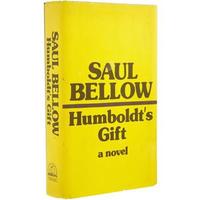
LOA: Would it be accurate to call Humboldt’s Gift Bellow’s most ambitious novel? It won the Pulitzer Prize and possibly clinched the Nobel Prize for him but some critics feel that Bellow never completely reconciles the three intersecting stories of Von Humboldt Fleischer, the goofy, self-destructive, genius poet; Charlie Citrine, the worldly, anxious, questing writer; and the dapper Chicago gangster Rinaldo Cantabile. Does it succeed on all fronts?
Wood: This is a coda to the last answer. I don’t think the three stories do fit together. What Bellow really wanted to do was to write the tragic story, in fictional terms, of his friend Delmore Schwartz, the manic, doomed poet, who had had such promise as a young poet, and who ended his life in paranoid obscurity in a flophouse in Times Square. This got mixed up with Bellow’s real interest in anthroposophy (explored as a genuine spiritual quest for Bellow, not as something just to be used in a novel) and his great love of Chicago. So that is exactly what you get in Humboldt—a great Chicago novel (there are passages in this book about Chicago that he never bettered: the old Russian baths, for instance); a great New York novel about Schwartz and about the role and status of the writer in modern America (Bellow did not invent the detail, by the way, of Humboldt lying in the morgue unidentified for two days; but he did add the wry line: “because there were no more readers of modern poetry”); and a less absorbing and successful novel about Cantabile, Renata, and Rudolf Steiner.
But again, I like the fact that in these large, loose novels of Bellow’s, the seams show; I like that, in some way, these books are too demanding for the tidiness of conventional realistic “success,” and burst the boundaries of the “successful.” When I first read these books, I felt a liberation, much as I had done when I first read Tolstoy, and much as a different kind of reader might feel when reading Pynchon. I thought, with gratitude and relief: “so: the novel doesn’t have to ‘add up’; or rather, the novel can add up to more than its parts, it can add up to a messy surplus; the novel doesn’t have to proceed along the familiar tracks of ‘plot’—it can proceed like an argument, or an essay, it can be stuffed with memory and autobiography. What holds it together may not be formal perfection but a certain consistency of voice, literary style, and moral seriousness.” It was a joy to realize this.
LOA: Because of the incidents of sex, violence, and murder that drive the plot, The Dean’s December has been attacked as misogynist, yet the book closes with a surprisingly moving, understated vignette of married love. Does Bellow get an unfair rap for how he portrays women?
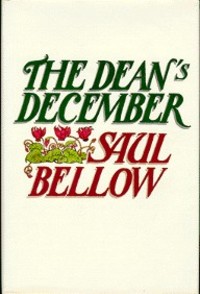
Wood: Yes, it’s curious that this novel is so often attacked (see James Atlas’s biography, which accuses it of exploiting a story from the newspapers, and adding a racist agenda). In fact, I think it is one of Bellow’s greatest achievements. The writing about Chicago is stupendously vivid and powerful (and though there is a definite conservative undertow, the quality of Bellow’s moral horror was not misplaced); the scenes set in the grayness of Communist Romania are sensitive and beautifully mordant; the counterpoising of the “hard nihilism” of Communist anti-capitalism with the “soft nihilism” of American capitalist excess seems brilliantly shrewd to me, and prophetic (after all, only a few years later, the hard nihilism of the Communist system would collapse and gleefully appropriate the soft nihilism of Western capitalism); and the novel offers the only complex portrait in Bellow’s work of a real marriage of equals.
LOA: Do you have any favorite scenes or passages in these novels?
Wood: The ending of Sammler; the early pages in Humboldt about Chicago, along with all the prose about Humboldt himself (who can forget the trip to Humboldt’s house in New Jersey, where even the trees looked “pauperized”?); the barely-veiled description of the Princeton scholar, R. P. Blackmur, with his anti-Semitic mutterings and his thin, “dry-cereal mustache” (I could go on, because for lovers of Bellow, Humboldt’s Gift, along with Herzog, comprise the great Bellow Bible); all the Romanian scenes and the final pages in The Dean’s December.
LOA: Critics have frequently found resemblances between Bellow’s characters and people Bellow knew; most notably, Delmore Schwartz as the basis for Humboldt. James Atlas’s biography of Bellow has many accounts of friends dismayed or upset at recognizing themselves in Bellow’s works. Did Bellow practice this more than other novelists? Did he think that, to paraphrase Citrine about Humboldt, “to be loused up by Bellow was really a kind of privilege”?
Wood: I think he did think this; but then, I think that all novelists actually think this: when have you ever heard a novelist apologize for representing someone he or she knew in print? Did Lawrence apologize, or Jean Rhys, or Proust, or Graham Greene? The differences are that most of them are not as gifted as Bellow was, and keep their self-regard a secret.
LOA: After Bellow’s death in 2005 Slate published several short pieces by contemporary writers testifying to his continued influence today. In “Gratitude,” your appreciation of Bellow in The New Republic, you wrote that you “judged all modern prose by his.” As a critic and book reviewer for almost two decades, do you see any writers emerging as heirs to Bellow, in terms of the scope of their vision, their writing style or sensibilities?
Wood: There seem to me quite a number of writers at work today who have read Bellow with appreciation and care—I can think of Jeffrey Eugenides, Joseph O’Neill (whose novel Netherland had a definite aftertaste of Seize The Day), John Wray, Adam Thirlwell, Ian McEwan (what was best in Saturday was owed to Bellow and Virginia Woolf).
LOA: When did you first discover Saul Bellow’s work? Will there be more Library of America Bellow volumes?
Wood: I first read him as a teenager, and his work hit me with great force: the poetry and joy of the language, first of all; and then the intellectual and spiritual restlessness, that seemed Russian as well as Jewish (remember that Bellow missed being born in Russia by only three or four years); and then the free-flowing structure of the big books. All of this was a delicious escape from the more strait-laced tone and rhythm of English postwar prose. I hope that the LOA project will collect all of Bellow’s work, in time. Most exciting would be the publication of some of Bellow’s unpublished work, including the long unfinished novel about his friend, Isaac Rosenfeld (aka “Max Zetland”) of which, I believe, a few hundred pages are extant.
